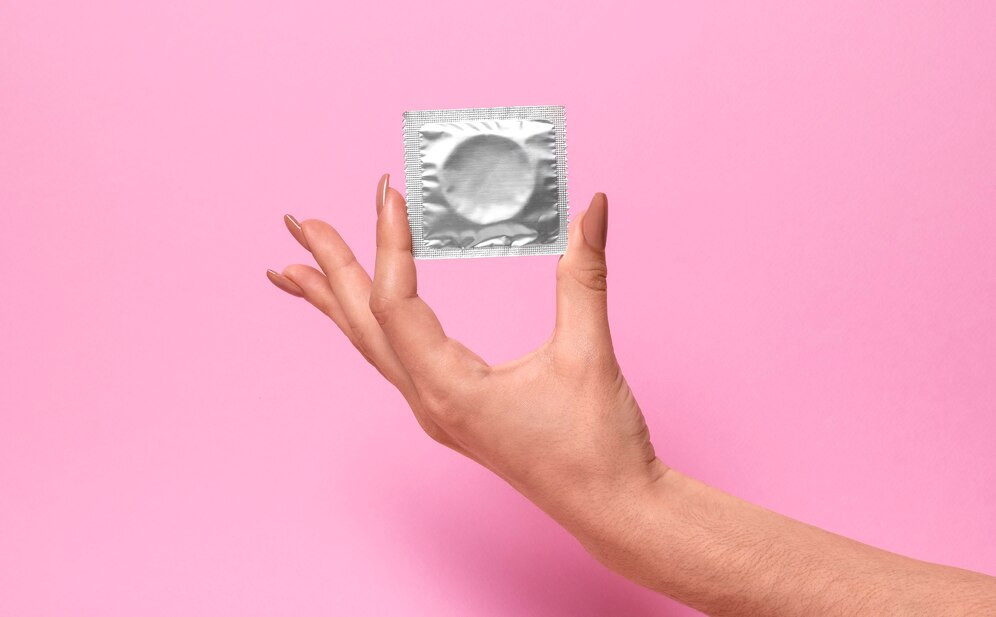Kondom adalah salah satu alat kontrasepsi yang tidak hanya membantu mencegah kehamilan namun juga melindungi dari penyakit menular seksual seperti HIV dan herpes. Umumnya kondom yang paling sering digunakan di Indonesia adalah kondom pria.
Kondom pria terbuat dari berbagai macam bahan seperti lateks, poliuretan atau poliisoprena. Cara kerja kondom adalah mencegah sperma mencapai sel telur dengan menampung ejakulasi di dalam kondom. Terdengar seaman itu, apakah mungkin hamil jika sudah memakai kondom?
Efektivitas Kondom dan Kemungkinan Kehamilan yang Terjadi Walau Memakai Kondom
Kondom merupakan salah satu metode kontrasepsi yang efektif dan mudah diakses, tetapi perlu dicatat bahwa tidak ada metode yang sepenuhnya 100% efektif dalam mencegah kehamilan.
Saat digunakan dengan benar dan konsisten setiap kali berhubungan seks, kondom pria memiliki tingkat efektivitas sekitar 98% dalam mencegah kehamilan. Ini berarti 2 dari 100 pasangan yang menggunakan kondom dengan benar setiap kali berhubungan seks mungkin mengalami kehamilan dalam satu tahun.
Dalam kenyataannya, kesalahan pemakaian dan ketidakkonsistenan dalam menggunakan kondom selama berhubungan seks memengaruhi efektivitas kondom sehingga efektivitasnya mungkin hanya sekitar 85%. Dengan efektivitas sekitar 85% ini, 15 dari 100 pasangan yang menggunakan kondom sebagai satu-satunya metode kontrasepsi mungkin mengalami kehamilan dalam satu tahun.
Baca Juga: Ini yang Perlu Dilakukan Jika Tiba-Tiba Kondom Robek
Faktor yang Memengaruhi Efektivitas Kondom
Ada beberapa hal yang memengaruhi efektivitas kondom dalam mencegah kehamilan, di antaranya:
Kerusakan kondom
Kondom bisa rusak karena banyak faktor, seperti cara penyimpanan yang tidak benar, penggunaan pelumas berbasis minyak yang dapat merusak kondom lateks, atau kerusakan saat membuka kemasan (misalnya membuka kemasan dengan gigi).
Untuk itu, perlu menyimpan kondom di tempat yang sejuk dan kering, serta menggunakan pelumas berbahan air atau silikon. Anda juga perlu berhati-hati dalam membuka kemasan kondom, menghindari gigitan pada kemasan dan menggunakan gunting atau alat lain dengan hati-hati.
Pemasangan yang tidak benar
Kondom harus dipasang di sisi yang benar, yaitu menghadap keluar dan tidak ada gelembung udara di ujungnya. Anda hanya perlu menyisakan ruang di ujung kondom untuk menampung sperma.
Kondom juga perlu dipasang sebelum ada kontak genital karena cairan praejakulasi juga bisa mengandung sperma.
Kondom kedaluwarsa
Kondom yang sudah kedaluwarsa mudah rusak dan tidak lagi memberikan perlindungan yang efektif. Selalu periksa kembali tanggal kedaluwarsa kondom dan hindari menggunakan kondom yang sudah melewati masa berlaku.
Baca Juga: Langkah-Langkah Menggunakan Kondom yang Benar
Bagaimana Mendapatkan Perlindungan Lebih Baik dari Kondom?
Untuk mendapatkan perlindungan lebih baik dari kondom dan meningkatkan efektivitas kondom, Anda perlu menggunakan kondom dengan benar dan konsisten di setiap berhubungan intim. Selain itu, Anda mungkin juga perlu menggunakan metode kontrasepsi lain seperti spermisida yang dapat membunuh sperma, atau pil KB darurat yang dapat membantu menghindari kehamilan bila kondom pecah atau terlepas di tengah aktivitas seks.
Apabila Anda memiliki pertimbangan penggunaan alat kontrasepsi lain dan kebingungan dalam memilih mana yang cocok untuk Anda, sebaiknya berkonsultasi terlebih dahulu dengan dokter atau ahli kandungan. Anda juga bisa memanfaatkan layanan konsultasi kesehatan dengan mengunduh aplikasi Ai Care melalui App Store atau Play Store.
Mau tahu informasi seputar penyakit lainnya? Cek di sini, ya!
- dr. Monica Salim
Kendall Planned Parenthood (2021). Can you get pregnant with a condom?. Available from: https://www.plannedparenthood.org/blog/can-you-get-pregnant-with-a-condom
Medicine.net. Should I Be Worried About Pregnancy if I Use a Condom?. Available from: https://www.medicinenet.com/birth_control_pictures_slideshow/article.htm
Cleveland Clinic (2022). Condoms. Available from: https://my.clevelandclinic.org/health/treatments/9404-condoms
Planned Parenthood. How effective are condoms?. Available from: https://www.plannedparenthood.org/learn/birth-control/condom/how-effective-are-condoms
Cashmere Lashkari, BSc. How Effective are Condoms?. Available from: https://www.news-medical.net/health/How-Effective-are-Condoms.aspx
WebMD (2021). Condoms. Available from: https://www.webmd.com/sex/birth-control/birth-control-condoms
Simone Marie (2020). Yes, Condoms Can Break Without You Knowing — but It're Rare. Here’s How to Avoid It. Available from: https://www.healthline.com/health/healthy-sex/can-condoms-break-without-you-knowing
Liz Seegert (2022). When to Use Backup Birth Control. Available from: https://www.webmd.com/sex/birth-control/backup-birth-control
Cleveland Clinic (2022). Morning-After Pill. Available from: https://my.clevelandclinic.org/health/treatments/23386-morning-after-pill











